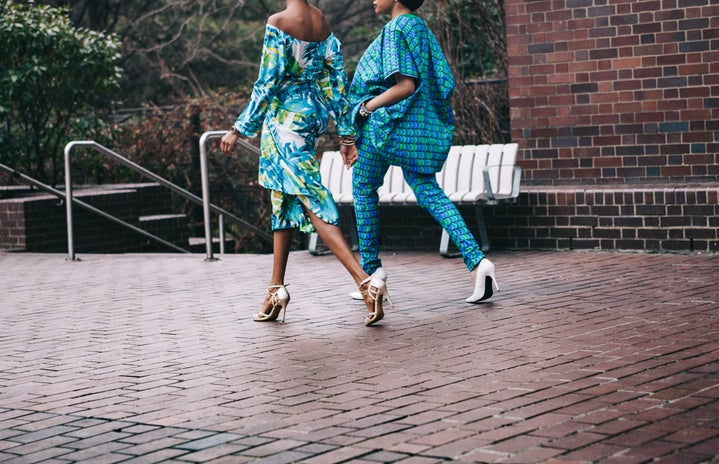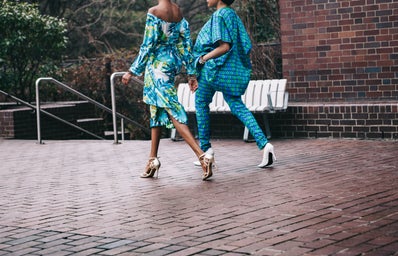“[sic]IM ACTUALLY CRYING,” Kayla Robinson, the 18-year-old founder of Green Box Shop posted on Instagram on July 28, 2017. “…THE LORD HIMSELF IS WEARING MY CREATION.”
Robinson was crying because, in a performance at Panorama Music Festival, singer Frank Ocean had worn a shirt purchased from Green Box Shop, reading: “Why be racist, sexist, homophobic, or transphobic when you could just be quiet?”
For Robinson, and for Green Box Shop, this was a defining moment. Fans had figured out the source of Ocean’s shirt less than 24 hours after he wore it—and so, in less than 24 hours, a small online business was catapulted into online stardom, boasting over 120,000 followers on Instagram even eight months later. In many ways, this is a fairytale success story—an 18-year-old bisexual Afro-Latina woman and her team of dynamic, courageous teenagers have made their way into the mainstream and into the fight for equality around the world. And that’s absolutely something to be celebrated.
But this fame comes with a more insidious side. A quick Google search demonstrates that Green Box Shop is no longer the only place to find the design that made them so famous. Other versions, sold at half price, are now everywhere, from eBay to Amazon to Etsy, with no credit to the original creators.
To be clear, the laws on plagiarism of fashion designs are relatively obscure. Copyright law only protects what is both original and not physically functional—and the U.S. Copyright Office ruled, one hundred years ago, that all fashion is functional. “You wouldn’t clean a house in a ballgown,” Susan Scafidi, founder of the Fashion Law Institute at Fordham Law School, said in an interview with fashion magazine Fashionista, “but nevertheless, it can’t be subject to copyright.” Since the area of pattern (as opposed to the item of clothing itself) is also grayer, it’s a very murky area when it comes to the legality—or lack thereof—of the designs that are produced by Green Box Shop, or indeed anyone.
But there’s a deeper problem within this plagiarism, beyond the strictly legal aspect of it. Green Box Shop has made it clear that they are a highly ethical company—their shirts are fair trade, and often they donate parts of the proceedings from their shirts to the charities they endorse. They do their part to aid social movements—at the time of writing this, half of the proceeds of T-shirt proclaiming “Honor Gun Victims With Actions,” “Arm Teachers With Resources, Not Guns,” or “Dismantle Corporate Politics,” will be donated to The Coalition to Stop Gun Violence. Green Box Shop, in essence, practices the progressive, feminist values that it preaches—while it is still a business, it gives back to the causes it supports.
So what does that mean, when third-party sellers can sell it for less and make money off of a social movement without giving back? While the message portrayed on the shirt is still present, the values imbued have vanished. With these third-party sellers, there is often no way to verify that they, too, use fair trade shirts, and it is much less likely that any of the money is donated to the organizations that Green Box Shop gives to. While the shirt still proclaims a message of feminism and progressivism, is it staying true to that movement?
There are, of course, other factors. The shirts sold at Green Box Shop are ethically produced and give back to the movements they support—but they also err on the pricey side of things, retailing at around $20 per shirt. Those sold by third parties are often much more affordable, despite their obvious shortcomings. But while cost (and the issue of ethical consumption under capitalism as a whole) will always be important considerations, it is clear that Green Box Shop’s pricing reflects the quality of the shirts, and the causes it gives back to. The same, unfortunately, cannot always be said for the third-party sellers.
Robinson is, as far as it can be possible under capitalism, an ethical business owner. While other, larger stores might slap messages onto shirts without much thought, she clearly puts a great deal of thought into hers, and gives back to the movements she visibilizes. But the appropriation of her designs demonstrate that it’s more important than ever to know where your clothes are coming from—to know that the company is ethical, that the pricing is reasonable, and that the laborers that make it are fairly paid. In a world that makes it easy to choose superficial statements over greater meaning and impact, it is important to keep choosing the latter, as often as we possibly can.
[Feature and second images by Unsplash; first image by author]



